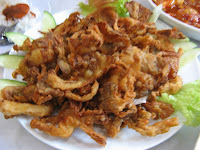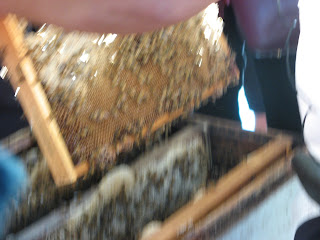 |
| Come and get a cold drink |
Have you ever wondered what it is like
to crawl on walls and ceilings like Spiderman? And from the ceiling, you look
down and everything is upside down? How does an upside-down house
appear? I had a chance to find this out on a trip to Malacca.
Recently my sister and I went on a day
trip to this historic town with a tour group.
Forty-four of us (including tour leader, Mr Lim Kean Huat), young and
old, had fun in an upside-down house. Besides the unusual house,
we watched how bees made honey, rode a decorated trishaw, climbed many steps to
St Paul’s Hill and tasted authentic nonya food.
We started off from Klang at 7 am. On
the way, we stopped in Seremban for a “dim sum” breakfast which pepped me up as
I was still sleepy from rising up early. After a brief stop at a herbal shop
for a nourishing bird's nest drink, our energetic group arrived at the
upside-down house in Malacca before noon.
 |
| Counter at the front desk: Tickets please |
Opened a few months ago, the house was
unique because all the furniture was constructed from the roof. We looked up to see the hall bedecked with a
television set and a coffee table. Next to it was the dining area with some
snacks laid out and further in was the kitchen with a fridge, an oven, cabinets
and spice-laden counter tops. In an adjoining room, a furnished child's room, a
master bedroom with a toilet at one corner, were displayed. All these furniture were
suspended from the ceiling, while we stood on the “floor” which was interspersed
with fluorescent lights.
 |
| Which channel do you prefer? |
 |
| Let me get some snacks |
 |
| Reaching out for some spices |
 |
| Which side of the bed should I sleep? |
 |
| Ready to flop on to the bed |
 |
| 8 people to sleep on one bed? |
 |
| I am using the toilet -no peeping! |
Basically, the fun part was taking pictures with the
corresponding furniture above. Our group took many pictures, posing in many
creative stances below our chosen furniture. Full of zest, all of us became “ instant actors”
for an hour, throwing away all inhibitions. I found the acting
"therapeutic" and enjoyable.
To get the Spiderman effect,all we have to do was to rotate
the picture 180o and hey presto - we have the illusion of being suspended
from the ceiling. Everyone enjoyed the extraordinary experience of being the
Wall Crawler - even though it was only in a picture!
After all that excitement, 44 hungry mouths
had a sumptuous nonya lunch of ayam pongteh (chicken and potato stew), curry fish,
prawn with petai (stink beans), fried mushroom and more. And to top
it all, we had the delightful dessert- cendol (coconut ice frosty), a welcome treat in the hot weather.
 |
| Ayam pongteh |
 |
| Prawn with petai |
 |
| Fried mushroom |
 |
| Delightful dessert - cendol |
After lunch, we visited Giant B, the largest honey producer in Malaysia. Mr Ong Kang Peng,
Apiculture Specialist and owner, was on hand to show us how bees were bred for
honey.
 |
| Giant B |
We were first led to the side of the building. We saw a whole row of beehive boxes.
 |
| Bee hives |
Ong proceeded to explain how bees made honey. As he pulled off a plastic sheet from one framework, thousands of bees emanated from the combs.
None of the busy bees bothered Ong who was not wearing any “armour”. He said he
was immune to bee bites, having worked for more than 38 years with these
amazing animals.
 |
| Pulling out a plastic sheet |
 |
| Thousands of bees |
Using tiny plastic spoons, Ong scooped out honey directly from the
combs and let everyone taste it. Mmm... I liked the pure and natural taste.
Next, he lifted out the framework to show us the honey comb.
 |
| Lifting out the framework |
 |
| Bees move to the bottom |
After all the bees had moved to the bottom, Ong scraped off the outer layer of wax with a small knife. He then cut off little cubes of the honey comb and let us taste the goey sweet stuff. Yummy!
He then led us to the gallery - a brightly coloured building, with well decorated models of bees on the outside of the building.
 |
| The front of the building |
Inside the gallery, Ong explained the exhibits on the walls, tracing the life-history of the
bees and the bee-breeding process. After extolling the health
benefits of honey, Ong let us taste bee-pupa. Mmm ...crunchy and crispy!
 |
| Ong holding up a bottle of bee-pupa |
Finally, the best part of the visit: Ong invited us to taste all the different grades of
honey (natural, propolis, royal jelly, tongkat ali, ginger etc). It was like wine-tasting. Big containers containing different grades of honey, each with a little tap, were displayed on a round table. We each took a small plastic cup, turn on the tap of the selected grade of honey and ...savour!
 |
| Honey-tasting: different grades of honey on a round table |
Everyone took advantage of this generous offer...I found most of the flavoured honey pleasant and soothing, although each has its own unique taste. There were smiles all around. Sweetness overwhelmed us, in our tongues as well as in our demeanour!
After the honey-tasting, many of us bought bottles of honey to bring home for our loved ones.
 |
| Sales-counter |
A visit to Malacca would not be complete
without setting foot on heritage places. Our bus took us to the Stadhuys (built by the Dutch in 1650), the oldest remaining Dutch historical building in the Orient. While
half of our group took an invigorating walk, the other half took trishaw rides, to
A Famosa, a fortress built by the Portuguese in 1511.
My
sister and I opted for the trishaw ride - what a relief for tired muscles! It was a long time since I had taken a ride on
the 3-wheel vehicle - a common mode of transport in Malaysia during the 1940s
and 1950s.
 |
| My sister and I |
 |
| Two senior friends |
We walked around the fortress and captured some memorable shots there.
 |
| A Famosa |
 |
| Our tour group in front of A Famosa |
While other members of our tour group went to explore other buildings, my sister and I climbed many tiring steps up to the St Paul's Hill.
 |
| Many steps up to St Paul's Hill |
It was
exhausting, but the breezy air and interesting views from the top was worth it. Looking around at the Dutch
burial ground, St Paul's Church and St Francis Xavier's Marble Statue, brought
back memories of History lessons in my Secondary School. Gazing far out at sea (the Straits of Malacca), I visualized how the Portuguese (1511) and the
Dutch (1641) arrived on our Malaysian shores.
 |
| St Francis Xavier Statue in front of St Paul's Church |
 |
| Gazing out at the Straits of Malacca |
Fascinated with some of the souvenirs on display at many stalls
there, I bought some "kebaya-designed" key chains etc for my grandchildren. Many young
people, foreign and local, were up there
too, probably reminiscing on their History lessons, like me.
 |
| Souvenir stall |
Soon it was time to bade farewell to Malacca.
On our trip back, we stopped in Seremban for dinner. However, after the "sweet" honey tasting, we did not do justice to the heavy meaty meal. Tired but happy, we arrived in Klang at about 10.30 pm.
Malacca, a UNESCO World Heritage Site, never fails to intrigue me. There will always be something new to discover and something old to reminisce on.
































No comments:
Post a Comment